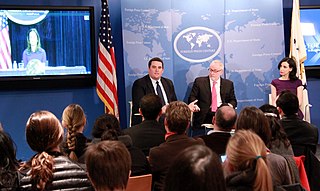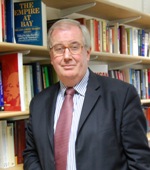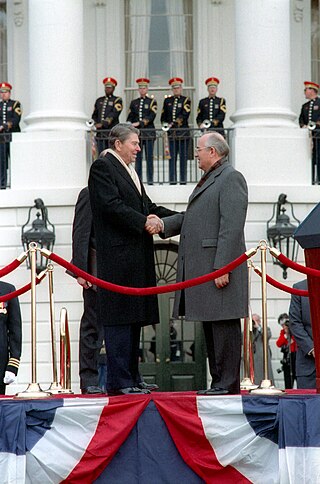
A diplomat is a person appointed by a state or an intergovernmental institution such as the United Nations or the European Union to conduct diplomacy with one or more other states or international organizations.

International relations (IR) are the interactions among sovereign states. The scientific study of those interactions is called international studies, or international affairs. In a broader sense, it concerns all activities between states—such as war, diplomacy, trade, and foreign policy—as well as relations with and among other international actors, such as intergovernmental organisations (IGOs), international nongovernmental organisations (INGOs), international legal bodies, and multinational corporations (MNCs). There are several schools of thought within IR, of which the most prominent are realism, liberalism, and constructivism.
In politics, hard power is the use of military and economic means to influence the behavior or interests of other political bodies. This form of political power is often aggressive (coercion), and is most immediately effective when imposed by one political body upon another of lesser military and/or economic power. Hard power contrasts with soft power, which comes from diplomacy, culture and history.
Diplomatic history deals with the history of international relations between states. Diplomatic history can be different from international relations in that the former can concern itself with the foreign policy of one state while the latter deals with relations between two or more states. Diplomatic history tends to be more concerned with the history of diplomacy, but international relations concern more with current events and creating a model intended to shed explanatory light on international politics.

A state's foreign policy or external policy is its objectives and activities in relation to its interactions with other states, unions, and other political entities, whether bilaterally or through multilateral platforms. The Encyclopedia Britannica notes that a government's foreign policy may be influenced by "domestic considerations, the policies or behaviour of other states, or plans to advance specific geopolitical designs."
In international relations, public diplomacy or people's diplomacy, broadly speaking, is any of the various government-sponsored efforts aimed at communicating directly with foreign publics to establish a dialogue designed to inform and influence with the aim that this foreign public supports or tolerates a government's strategic objectives. These also include propaganda. As the international order has changed over the twentieth century, so has the practice of public diplomacy. Its practitioners use a variety of instruments and methods ranging from personal contact and media interviews to the Internet and educational exchanges.
In diplomacy, an attaché is a person who is assigned to the diplomatic or administrative staff of a higher placed person or another service or agency. Although a loanword from French, in English the word is not modified according to gender.
Citizen diplomacy is the political concept of average citizens engaging as representatives of a country or cause either inadvertently or by design. Citizen diplomacy may take place when official channels are not reliable or desirable; for instance, if two countries do not formally recognize each other's governments, citizen diplomacy may be an ideal tool of statecraft. Citizen diplomacy does not have to be direct negotiations between two parties, but can take the form of: scientific exchanges, cultural exchanges, and international athletic events.
Nation branding aims to measure, build and manage the reputation of countries. In the book Diplomacy in a Globalizing World: Theories and Practices, the authors define nation branding as "the application of corporate marketing concepts and techniques to countries, in the interests of enhancing their reputation in international relations." Many nations try to make brands in order to build relationships between different actors that are not restricted to nations. It extends to public and private sectors in a nation and helps with nationalism. States also want to participate in multilateral projects. Some approaches applied, such as an increasing importance on the symbolic value of products, have led countries to emphasize their distinctive characteristics. The branding and image of a nation-state "and the successful transference of this image to its exports - is just as important as what they actually produce and sell." This is also referred to as country-of-origin effect.

Digital diplomacy, also referred to as Digiplomacy and eDiplomacy, has been defined as the use of the Internet and new information communication technologies to help achieve diplomatic objectives. However, other definitions have also been proposed. The definition focuses on the interplay between internet and diplomacy, ranging from Internet driven-changes in the environment in which diplomacy is conducted to the emergence of new topics on diplomatic agendas such as cybersecurity, privacy and more, along with the use of internet tools to practice diplomacy.

Michael E. Cox is a British academic and international relations scholar. He is currently Emeritus Professor of International Relations at the London School of Economics (LSE) and Director of LSE IDEAS. He also teaches for the TRIUM Global Executive MBA Program, an alliance of NYU Stern and the London School of Economics and HEC School of Management.
Daryl Copeland is a Canadian analyst, author, speaker and educator specializing in diplomacy, international policy, public management and global issues. Copeland's institutional affiliations include the University of Toronto's Munk Centre for International Studies as a senior fellow, and the USC Center on Public Diplomacy as a research fellow.

Diplomacy comprises spoken or written communication by representatives of states intended to influence events in the international system.
The Fletcher School of Law and Diplomacy is the graduate school of international affairs of Tufts University, in Medford, Massachusetts. Fletcher is one of America's oldest graduate schools of international relations and is well-ranked in its masters and doctoral programs. As of 2017, the student body numbered around 230, of whom 36 percent were international students from 70 countries, and around a quarter were U.S. minorities. The school's alumni network numbers over 9,500 in 160 countries, and includes foreign heads of state, ambassadors, diplomats, foreign ministers, high-ranking military officers, heads of nonprofit organizations, and corporate executives.

Full spectrum diplomacy is a combination of traditional, government-to-government diplomacy with the many components of public diplomacy as well as the integration of these two functions with other instruments of statecraft. The term was coined by Dr. John Lenczowski, the founder and president of The Institute of World Politics in Washington, D.C. in his book Full Spectrum Diplomacy and Grand Strategy: Reforming the Structure and Culture of U.S. Foreign Policy which was released in May, 2011.

Science diplomacy is the use of scientific collaborations among nations to address common problems and to build constructive international partnerships. Science diplomacy is a form of new diplomacy and has become an umbrella term to describe a number of formal or informal technical, research-based, academic or engineering exchanges, within the general field of international relations and the emerging field of global policy making.
Nabil Ayad is an academic in the field of diplomacy and international governance. He is currently a member of the International Institute for Strategic Studies, the Royal Institute of International Affairs and an Associate Member of the London Diplomatic Association.
Dashdorj Bayarkhuu is a Mongolian research professor, columnist and writer and former ambassador of Mongolia to Egypt. Prior to his nomination to the ambassadorial position, Bayarkhuu worked in media, defense, diplomatic and educational sectors. After his tenure as ambassador in Cairo, Bayarkhuu returned to academic field as a Visiting Professor of International Politics and Contracted Researcher. He joined the Ministry of Foreign Affairs of Mongolia as Deputy Director, Policy Planning & Co-ordination Department in 2015–2016.
Katarzyna Emanuela Pisarska is a Polish social entrepreneur, civic activist and academic, specializing in diplomacy and foreign policy.
Data diplomacy can be defined in two different ways: use of data as a means and tool to conduct national diplomacy, or the use of diplomatic actions and skills of various stakeholders to enable and facilitate data access, understanding, and use. Data can help and influence many aspects of the diplomatic process, such as information gathering, negotiations, consular services, humanitarian response and foreign policy development. The second kind of data diplomacy challenges traditional models of diplomacy and can be conducted without tracks and diplomats. Drivers of change in diplomacy are also emerging from industry, academia and directly from the public.







